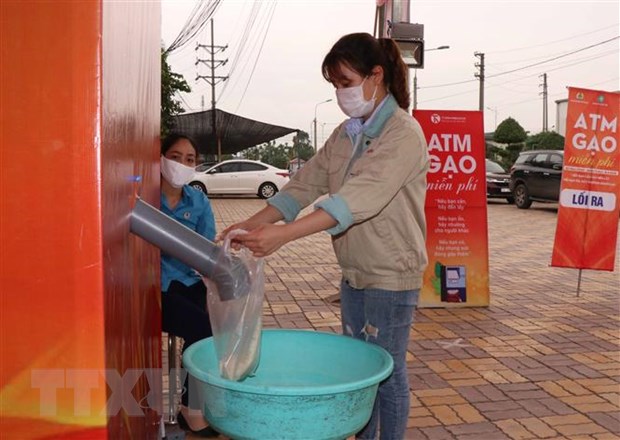 Society
Society


|
| A worker gets free rice at a rice ATM at Quế Võ Industrial Zone in the northern province of Bắc Ninh. The province's Trade Union mobilised donations to launch the rice ATM programme. —VNA/VNS Photo Thái Hùng |
HÀ NỘI — Ninety–one strikes occurred in Việt Nam in the first five months of this year, mostly due to stagnant production – a major negative impact of the COVID-19 pandemic on enterprises and workers.
Only 66 strikes were reported in the same period last year and, in the whole year, there were a total of 121 strikes, half of those reported in 2018.
Vice standing president of Việt Nam General Confederation of Labour Trần Thanh Hải said at a meeting on Monday that the COVID-19 pandemic caused production to stagnate and, thus, enterprises were shut down, suspended or downsized. As a result, workers who stopped working asked for their rights and benefits to be ensured.
When workers did not agree with their employers’ salary payment mechanisms, for example, year-end bonuses, delayed salary payments, or poor quality of meals provided at the enterprises’ canteens, they also went on strike, Hải said.
“As soon as the strikes happened, trade unions in the companies co-operated with authorities to settle the strikes and satisfy workers’ legitimate requests and the workers resumed work,” he said.
However, Hải said that in the strike of 8,000 workers at Taiwanese-invested Chí Hùng Ltd Company in the northern province of Hải Dương late last month, false reports appeared on social media, criticising the role of the trade union.
According to reports by local trade unions, by the end of April, as many as 5,681 enterprises and 1,310 non-public units nationwide were dissolved, suspended or reduced their production size, which affected jobs and livelihoods of over 461,000 workers.
Hải said there were cases in which employers used measures forcing employees to terminate their contracts while the enterprises could still manage to maintain production.
Enterprises specialising in producing goods for export, like textile or footwear companies, had to lay off some of their workers as major clients in pandemic-hit markets reduced or cancelled their orders.
During the COVID-19 pandemic, the Việt Nam General Confederation of Labour has worked together with the Government, agencies and the community in disease prevention and control as well as supporting COVID-19 affected workers.
Nearly VNĐ500 billion (US$216,500) was given to workers who were suffering difficulties during the pandemic. The trade unions in localities joined with other individuals and organisations to launch meaningful programmes like rice ATMs and zero-đồng supermarkets which offer free essential goods to workers. The trade unions also called on landlords to reduce rental rates for workers.
Chairwoman of HCM City’s Trade Union Trần Thị Diệu Thuý said that forecasting on the production, trade and employment of COVID-19-hit enterprises was needed, so proper measures would be taken to protect trade union members as well as ensure the livelihoods of workers. — VNS




